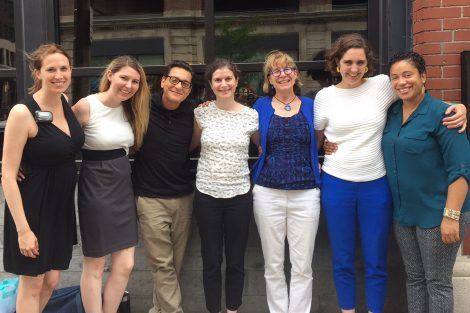The Harvard SOGIE Health Equity Research Collaborative celebrates its 10-year anniversary during Pride Month 2021
June 22, 2021 – One day in June 2011, a handful of Harvard-affiliated researchers sat around a small table in a cramped sixth-floor library in Boston Children’s Hospital to talk about forming a collaborative focused on LGBTQ health. At the time, research on the topic was limited, focused mainly on simply documenting the fact that health disparities exist between LGBTQ individuals and their heterosexual, cisgender peers.
This June, the group—known as Harvard SOGIE (Sexual Orientation and Gender Identity and Expression) Health Equity Research Collaborative—celebrates its 10th anniversary. Based at Harvard T.H. Chan School of Public Health and Boston Children’s Hospital, Harvard SOGIE now has 100+ members—including staff, trainees, and faculty, either currently or formerly affiliated with Harvard—from more than a dozen academic institutions across the U.S.
The field of LGBTQ health research has blossomed, according to Brittany Charlton, an assistant professor in the Department of Epidemiology at Harvard Chan School, who co-directs Harvard SOGIE along with Sabra Katz-Wise, an assistant professor in the Department of Social and Behavioral Sciences. “Only recently have we been able to elucidate some of the mechanisms that drive health disparities between LGBTQ people and heterosexual, cisgender people,” said Charlton, who wrote about SOGIE’s milestone in a recent Twitter thread. “We’re at a turning point in the field where it’s possible to design interventions, advocate for policy changes, and improve the lives of LGBTQ people.”
Founded by Bryn Austin, professor in the Department of Social and Behavioral Sciences at Harvard Chan School and research scientist in the Division of Adolescent and Young Adult Medicine at Boston Children’s Hospital, Harvard SOGIE supports researchers in a variety of ways—through biweekly works-in-progress meetings, journal clubs, professional development workshops, peer mentorship lunches, grant writing sessions, and seminar series.
Harvard SOGIE has also hosted advocacy trainings in order to help its members advocate for LGBTQ-inclusive policies like the Massachusetts Healthy Youth Act. “This bill would ensure youth receive sex education that is evidence-based, including age-appropriate information about sexual orientation and gender identity,” Charlton said. “It was introduced a decade ago—the same year that Harvard SOGIE was founded—and it’s critical that it passes.” Research from Charlton and her team has revealed that LGBTQ youth, in particular, need sex education; for example, LGBTQ youth have more unintended pregnancies than their heterosexual, cisgender peers. A recent study led by Ari Tabaac, an instructor at Boston Children’s Hospital, found that LGBTQ youth are seeking out supplemental sex education from peers and media as school-based curricula do not meet their needs.
Filling knowledge gaps
Charlton’s research team has focused over the last decade on documenting reproductive health issues facing LGBTQ people. “We know that this population is more vulnerable to poor gynecological health and they encounter barriers in their gynecological care,” said Charlton. “Despite the mounting evidence of gynecological disparities, we actually know almost nothing about the obstetrical health of LGBTQ people, or the health of their offspring at birth. This is especially troubling because we know that bisexual and lesbian women are more likely than heterosexual women to experience depression and to use substances—all because of the discrimination and stigma that LGBTQ people encounter—and that these are risk factors for adverse obstetrical outcomes.”
Charlton and her colleagues are helping to fill the research gap. She’s principal investigator of a new five-year R01 grant from the National Institutes of Health to study sexual orientation–related disparities in obstetrical and perinatal health, drawing on data from Harvard’s longitudinal studies, including the Nurses’ Health Study and the Growing Up Today Study. Co-investigators on the grant include Austin, Sebastien Haneuse, Jorge Chavarro, and Heather Eliassen, all from Harvard Chan School; and Bethany Everett of the University of Utah. “This new grant will enable us to reveal the needs of these vulnerable groups, and then be able to target interventions and improve the health of subsequent generations,” Charlton said.
Charlton and co-investigators Austin, Chavarro, and Stacey Missmer are also working to quantify sexual orientation–related cancer disparities and pinpoint the risk factors for such cancers, funded by a five-year grant from the American Cancer Society.
Other recent research by Harvard SOGIE members has covered a wide range of topics. For example, the New England Journal of Medicine published a Perspective piece by Carl Streed and colleagues about the importance of collecting data on sexual orientation and gender identity. Another study led by Alex McDowell revealed how non-discrimination policies lead to improved mental health among transgender individuals—those whose gender identity is different than their sex assigned at birth. Research led by Jessica Kremen outlined the harm of new legislation restricting access to healthcare for transgender youth.
Charlton described research in the field of LGBTQ health as “continuing to flourish,” propelled by growing interest around issues of health inequity. “People are increasingly thinking about the health of vulnerable populations—and that must include the LGBTQ community,” she said. “This is such a thrilling time to be in this field.”
photo courtesy Brittany Charlton
